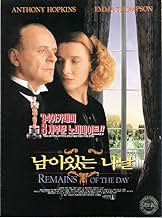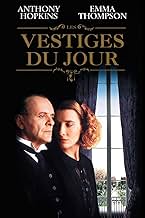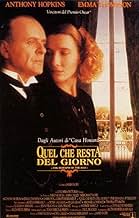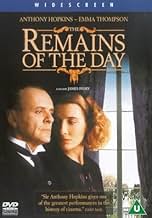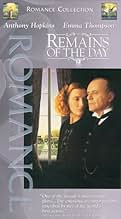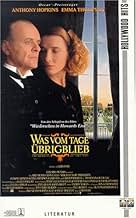Un mayordomo que sacrificó cuerpo y alma al servicio de su aristocrático señor en los años previos a la Segunda Guerra Mundial se da cuenta demasiado tarde de cuan mal emplazada está su leal... Leer todoUn mayordomo que sacrificó cuerpo y alma al servicio de su aristocrático señor en los años previos a la Segunda Guerra Mundial se da cuenta demasiado tarde de cuan mal emplazada está su lealtad.Un mayordomo que sacrificó cuerpo y alma al servicio de su aristocrático señor en los años previos a la Segunda Guerra Mundial se da cuenta demasiado tarde de cuan mal emplazada está su lealtad.
- Nominado a 8 premios Óscar
- 17 premios ganados y 42 nominaciones en total
Abigail Hopkins
- Housemaid
- (as Abigail Harrison)
- Dirección
- Guionistas
- Todo el elenco y el equipo
- Producción, taquilla y más en IMDbPro
Argumento
¿Sabías que…?
- TriviaSir Anthony Hopkins, as a guest on Inside the Actors Studio (1994), said that he got tips on how to play a butler from real-life butler Cyril Dickman, who served for fifty years at Buckingham Palace. Dickman said "There's nothing to being a butler, really; when you're in the room, it should be even more empty."
- ErroresAs the camera recedes in the final aerial shot departing from the estate, it briefly reveals a modern, silver-colored hatchback automobile backed up to the left end of the building.
- Bandas sonorasBlue Moon
Composed by Richard Rodgers and Lorenz Hart
Opinión destacada
This is, in my opinion, the finest film in the Merchant Ivory canon. And to hail it as such is to grossly undersell it. It is not only that but also the best story of unrequited love in cinema history, and a masterpiece of understated emotion. It also boasts some of the finest performances ever put on film, most notably from the peerless Anthony Hopkins.
Then again, understatement is the key to this film. Writer Ruth Prawer Jhabvala and Director James Ivory adapt Kazuo Ishiguro's poignant novel with such delicacy that it gets under ones skin in a deeply profound way difficult to express in a few words.
The plot opens in the 1950's as meticulous and emotionally repressed butler Stevens (Anthony Hopkins) reviews a lifetime of service in Darlington Hall. The story flashes back to the 1930's where Stevens formed a close friendship with housekeeper Miss Kenton (Emma Thompson). This relationship grew slowly over several years and ultimately the pair developed romantic feelings for one another, although neither admitted it. Whilst all this was happening, Steven's employer Lord Darlington (Edward Fox) gradually became a misguided Nazi sympathiser in pre-war Europe. Unfortunately, loyalty to his master caused Stevens to reject the delicate advances of Miss Kenton. History took its inevitable course, and Darlington's involvement in appeasement contributed to the outbreak of World War II. Now Stevens realises he made a mistake and wants to make amends.
To describe Anthony Hopkins as brilliant is completely redundant. His turn here goes way beyond mere acting, and it was criminal he was denied the Oscar at the 1994 Academy awards. Stevens absurdly repressed personality gently takes the audience from laughter to tears in the most emotionally devastating finale I have ever seen. Hopkin's mesmerising performance is matched by a career-best turn from Emma Thompson. The supporting cast is uniformly superb, including a pre-Four Weddings Hugh Grant and Christopher Reeve in one of his last roles before the accident that paralysed him.
Needless to say, the cinematography, music, editing and art direction are immaculate. The understated beauty of the English countryside that was so important to the book translates brilliantly to film here.
This is a lovely, melancholic film, which effortlessly embraces complex themes such as misguided loyalty, dignity, pride, wasted lives, and unrequited love. It would be all too much to bear if it weren't for the film's genuine good-humoured understanding of English culture (all the more remarkable for having been initially penned by a Japanese author). In fact, humour is an important element in the film. There are many laugh-out-loud moments, which make the tragic part of the story all the more real and poignant. All in all, The Remains of the Day is a milestone film an unforgettable tragedy of a man who pays the terrible price of denying his own feelings.
Then again, understatement is the key to this film. Writer Ruth Prawer Jhabvala and Director James Ivory adapt Kazuo Ishiguro's poignant novel with such delicacy that it gets under ones skin in a deeply profound way difficult to express in a few words.
The plot opens in the 1950's as meticulous and emotionally repressed butler Stevens (Anthony Hopkins) reviews a lifetime of service in Darlington Hall. The story flashes back to the 1930's where Stevens formed a close friendship with housekeeper Miss Kenton (Emma Thompson). This relationship grew slowly over several years and ultimately the pair developed romantic feelings for one another, although neither admitted it. Whilst all this was happening, Steven's employer Lord Darlington (Edward Fox) gradually became a misguided Nazi sympathiser in pre-war Europe. Unfortunately, loyalty to his master caused Stevens to reject the delicate advances of Miss Kenton. History took its inevitable course, and Darlington's involvement in appeasement contributed to the outbreak of World War II. Now Stevens realises he made a mistake and wants to make amends.
To describe Anthony Hopkins as brilliant is completely redundant. His turn here goes way beyond mere acting, and it was criminal he was denied the Oscar at the 1994 Academy awards. Stevens absurdly repressed personality gently takes the audience from laughter to tears in the most emotionally devastating finale I have ever seen. Hopkin's mesmerising performance is matched by a career-best turn from Emma Thompson. The supporting cast is uniformly superb, including a pre-Four Weddings Hugh Grant and Christopher Reeve in one of his last roles before the accident that paralysed him.
Needless to say, the cinematography, music, editing and art direction are immaculate. The understated beauty of the English countryside that was so important to the book translates brilliantly to film here.
This is a lovely, melancholic film, which effortlessly embraces complex themes such as misguided loyalty, dignity, pride, wasted lives, and unrequited love. It would be all too much to bear if it weren't for the film's genuine good-humoured understanding of English culture (all the more remarkable for having been initially penned by a Japanese author). In fact, humour is an important element in the film. There are many laugh-out-loud moments, which make the tragic part of the story all the more real and poignant. All in all, The Remains of the Day is a milestone film an unforgettable tragedy of a man who pays the terrible price of denying his own feelings.
- sdillon-1
- 29 jul 2003
- Enlace permanente
Selecciones populares
Inicia sesión para calificar y agrega a la lista de videos para obtener recomendaciones personalizadas
- How long is The Remains of the Day?Con tecnología de Alexa
Detalles
- Fecha de lanzamiento
- País de origen
- Sitio oficial
- Idiomas
- También se conoce como
- The Remains of the Day
- Locaciones de filmación
- Dyrham Park, Dyrham, Gloucestershire, Inglaterra, Reino Unido(Darlington Hall: driveway and exterior of the Mansion)
- Productoras
- Ver más créditos de la compañía en IMDbPro
Taquilla
- Presupuesto
- USD 15,000,000 (estimado)
- Total en EE. UU. y Canadá
- USD 23,237,911
- Fin de semana de estreno en EE. UU. y Canadá
- USD 1,528,982
- 7 nov 1993
- Total a nivel mundial
- USD 23,240,144
- Tiempo de ejecución2 horas 14 minutos
- Color
- Relación de aspecto
- 2.39 : 1
Contribuir a esta página
Sugiere una edición o agrega el contenido que falta

Principales brechas de datos
By what name was Lo que queda del día (1993) officially released in India in Hindi?
Responda



